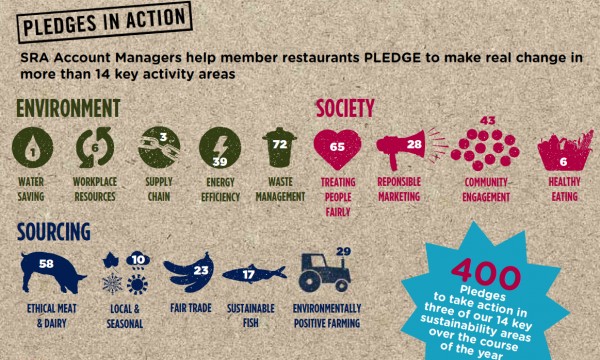 If, as a well known TV nutritionist would have us believe, we are what we eat, then how, where and what we cook are critical elements of this equation.
If, as a well known TV nutritionist would have us believe, we are what we eat, then how, where and what we cook are critical elements of this equation.
For a number of years consumers have taken a keen interest not just in how much they eat and the health benefits of their meals, but also in where the food comes from and how it’s been produced. This awareness has been reflected in the huge range available in the retail sector. Customers can choose from a dizzying selection in most supermarkets – or opt to shop in a local farmers’ market.
Until really quite recently restaurants were lagging behind. But, as diners began to expect their eating out experience to match their values, too, restaurants started to respond.
Anecdotally it was apparent that for many busy chefs and restaurateurs, while they shared the good intentions they struggled to find the time or expert advice and support to fulfil properly their customers’ expectations.
So, in 2010 the Sustainable Restaurant Association was born. Its founders, including Henry Dimbleby (Leon) and Mark Sainsbury (The Zetter), all had experience of running restaurants and knew the challenges faced by their industry colleagues. Now two years later and the association is providing advice, support, information and recognition for more than 1,000 sites of all types across the UK. From the north of Scotland to the Channel Islands, Michelin-starred restaurants like Le Manoir aux Quat’Saisons, large groups like Prezzo, neighbourhood favourites like Lussmanns, pubs, fish and chip shops, contract caterers, museums and mobile caterers are all committed to running their businesses more sustainably with the help of the SRA.
Crucially, the SRA has also given diners the means of making an informed choice about where they eat out. The SRA Sustainability Rating awards restaurants that complete the 65 question survey a One, Two or Three Star rating – on the basis of their sustainability across the business, covering all aspects of their sourcing, their waste, water and energy efficiency and how they treat their staff, customers and wider community.
As the SRA continues its mission to provide support and advice across the sector it is focusing more closely on cookery schools. Cookery School in central London was the first to complete the SRA Sustainability Rating in March this year, achieving a Three Star rating. Operating in many of the same ways as restaurants, cookery schools can benefit from the recognition the rating brings as well as the same consultancy service that is at the core of SRA restaurant membership.
The SRA has helped Cookery School in all three of the SRA’s key areas – Sourcing, Environment and Society. It now uses eco cleaning products exclusively, all its napkins, hand towels and blue roll are recycled, it has switched to organic and Fairtrade sugar and now has all its food waste collected, none of it going to landfill.
As a result of the recommendations made in its rating report Cookery School will be working with the SRA to make further improvements, like gaining Marine Stewardship Council (MSC) Chain of Custody certification to show that it is part of a fully sustainable seafood supply chain, and installing energy smart meters to help reduce use.
The SRA sees its role as a supporter, rather than enforcer and many of the suggested changes help operators save money.
The SRA has developed an online sustainability training programme for mobile caterers and will over the next few months be looking to do the same for cookery schools to help staff understand what to do, how to do it and the benefits involved.
For more information about working with the SRA, please contact call 020 7479 4224 or email hello@thesra.org ; www.thesra.org
Read more about sustainable cookery courses here
